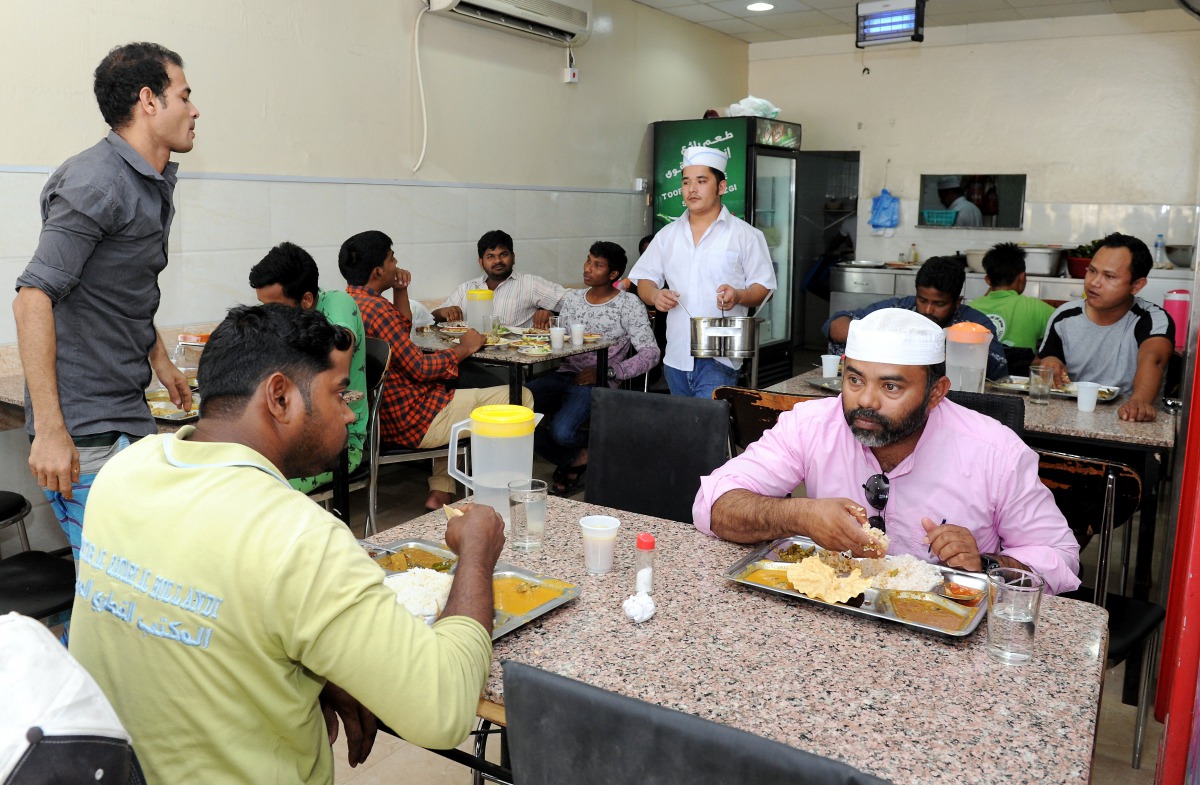
The entance of Thuraya Restaurant in Matar Qadeem street. Pictures by Salim Matramkot
A small eatery in Doha seats 28 and serves a meal so cheap it would seem it should go out of business. But the owners have been dishing out this subsidised lunch for many decades.
Welcome to Thuraya Restaurant in Matar Qadeem street where all you have to pay is QR5 for a south Indian meal or, more precisely, the Malabar-style thali comprising rice, fish curry, fish fry, vegetable curry, pickle, thoran, papadam and payasam.
Matar Qadeem street’s huge, round the clock, bachelor customer base -- consists mainly of employees working for organisations such as Qatar Airways and its various subsidiary companies -- never leaves the neighborhood’s eateries in want of customers. You’ll see well-known names such as Afghan House Al Mandi Restaurant, Subway, Al Qarmouty Sea Food Restaurant, Baba Chapatea, Mr Shawarma, Habeeb Restaurant, Mr Broast and Tea Time compete with lesser ones such as Thuraya. Interestingly the street starts with Papa John’s in east and ends with Turkey Restaurant in west.
At Thuraya, fish curries are cooked in varied styles. But the pieces of fish are invariably small and the gravy a little watery. You like the meal one day, but are not so pleased by it the next. Sambar is often replaced by dal. Supplies of papadam and payasam run out if you are late. And butter milk disappeared from the menu recently, the owners say, because of a lack of quality supply. Still, the hotel enjoys generations of loyal customers it has garnered in its 40-year history.

Thuraya owes its popularity largely to its cheapest meal. Nearby Al Hajaj Restaurant, which enjoys the patronage of Qataris and expats alike with its richer history of 45 years, charge QR6 and the slightly pretentious Kottaram Restaurant charge QR7. All these three with Kari Kari and Regal are run by the same ethnic community—Moplahs of North Malabar in India—who enjoy a near complete ethnic niche in the business. Noted Malayalam writer Shihabudheen Poythumkadavu chronicled the community’s monopoly in the restaurant business in the Arabian Gulf in a widely read essay titled Nadapuram Cafetaria in Kerala’s Bhashaposhini magazine.
When this correspondent sat with Eroth Kandy Najeeb, who is one of the partners now running the business, he said it’s “out of a commitment” that the restaurant provides the lunch at such a reasonable price. “We have customers from all sections and nationalities. Indians, Sri Lankans, Pakistanis, Bangladeshis, Nepalis make the most of it.”
Najeeb’s talk was peppered with his frequent use of the word Sadharanakkaran, which can be translated into English as ‘common man’. Incidentally, this so-called common man is a very frequent word in the language of India, Najeeb’s home country. It’s used an electoral plank by parties who weave and sell their vision of a brighter India. The Times of India ran a famous cartoon called The Common Man for over half a century drawn by the legendary cartoonist R K Laxman. Taxman turned anti-corruption activist Arvind Kejriwal launched his political party four years ago by using the ‘common man’ catchphrase.
Najeeb, his elder brothers Subair and Shoukath are from Kuningad, a village near the Vadakara town of Kozhikode district, a major urbanized area in Kerala, India. The business was founded by one Edachery Kandy Abdurahman, a “non-greedy” businessman according to Najeeb. “In the morning we serve dosa, masladosa, idiyappam, porotta with cherupayar, kadala, mutton and beef curries. Egg roasts and keema also have followings.” Evenings, it goes slightly multi-cuisine mode with a grilled chicken, chicken chukka and such items. And majboos is served on Thursdays and Sundays. This lack of cuisine purity is also a hallmark of small-time eateries run by Malabaris. To quote tagline of a New Delhi restaurant, they are “inspired by world around us.”
Most items in the restaurant are priced at QR1 for a single dish while a “regular” biryani costs you QR9. “People come for our Friday-special Dum biryani (QR 10) as far away as Doha Jadeed,” says Najeeb.

A senior journalist who is an occasional patron says he loves Thuraya’s meal for its simplicity and use of “lesser food additives.” He guesses massive relocation of single, lower-income labourers to suburbs and labour cities hit their business. “But still Matar Qadeem is a bustling place where you hardly get easy vehicle parking.”
Four decades ago, there were only four commercial buildings on what is now Matar Qadeem Street, says Muhammed Ali, a senior staff in Al Hajaj Restaurant. Those buildings are the ones now housing Bu Matar Super Market , Corner Super Markets, Thuraya Restaurant, and Al Hajaj Restaurant.
Some of these businesses were set up at a time when there was not much legal regulation on municipal, consumer protection, labour departments. A typical business started when a philanthropically-minded Qatari built a building and handed it to a struggling Malabari for business. These entrepreneurs then employed workers from their native place. An increased influx of migrants from other countries and their diverse enterprises might have turned Malabari eateries almost invisible in Doha’s landscape, but their Chai Karak and Porotta remain the city’s quick working class meal.




